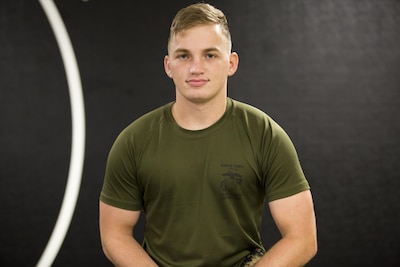By Marine Corps Lance Cpl. Tayler P. Schwamb, Marine Corps
Installations Pacific
CHATAN, Okinawa, Japan, Oct. 11, 2017 — “I’m never going to
hold anything back. If they want to learn something they are going to earn it.
I want to get them to where I am at. I don’t mind if they surpass me. I want
them to surpass me. I want them to be the best,” said Marine
Scott is a Harrison Township, Michigan, native, whose
unselfishness makes him one of the most sought-out martial arts instructors on
Okinawa. Marines who take his class emerge as stronger, better fighters with
sharpened minds. Scott teaches two to three separate Marine Corps Martial Arts
Program classes each month.
Scott said he intends to continue to selflessly dedicate his
time to teaching the Marine Corps Martial Arts Program, making elite
warfighters and better-rounded Marines and citizens.
‘This Is What I Want to Do’
“I can’t just stop. They appreciate what I do,” Scott said.
“This is a lifestyle. This is what I live, breathe, sleep and eat. This is what
I do.”
The Corps’ martial arts program combines hand-to-hand and
close-quarter techniques with lessons on warrior ethos, leadership and
teamwork. Program instructors must pass a grueling 15-day course to earn the
instructor’s tab on their belt and the right to train other Marines.
Scott’s compact body is usually littered with bruises from
the unforgiving blows of his students. He makes a point to teach all Marines
how to conduct themselves under duress and how to grapple while also stressing
the importance of teamwork and mental fortitude.
Scott said he played soccer for 12 years, but mixed martial
arts fighting was a different ball game. After consistent pestering, his mother
signed him up at the gym on his 14th birthday. Scott fought every single day
from then until he joined the Marine Corps.
‘You Have to Fight to Get Better’
“I would come home
with black eyes, busted lips, bruised everything,” Scott said. “I had days I
didn’t want to go because it hurt, but I never wanted to quit. I got my butt
kicked all of the time. There wasn’t a day where I didn’t lose but that’s what
happens when you are fighting. You have to get beat up. You have to fight to
get better.”Yet, despite his previous fighting experience, Scott’s path to
becoming a Marine Corps martial arts instructor was not always smooth.
“When I came into the Marine Corps I didn’t know what
motivation really was and because of that I didn’t like [Sgt. Kendrick W.
Powdrill] at all,” Scott said. “He was a sergeant of Marines to the fullest
extent. He got his [instructor’s] tab just so he could take care of his Marines
at the chow hall, helping us belt up when it wasn’t really an option before. He
could do anything and everything. He taught me life lessons, man-to-man stuff.
He always had my back and I always had his. Good, bad, right or wrong. I do the
same for my Marines. I will help anyone that comes to my MCMAP class, even
though some people don’t like asking for help.”
At the time, Powdrill was the chief cook at the Camp Foster
Chow Hall and Scott’s mentor. Scott said he took Powdrill’s life lessons to
heart, consistently sacrificing his own time and energy to help shift workers,
people on other bases with lack of transportation and Marines with hectic
schedules.
Scott is known for his flexibility and understanding. He
ensures that each Marine is well-versed in martial arts techniques and
grappling.
Marines like Cpl. Sara Lopez, an administrative specialist
with Scott’s Headquarters and Support Battalion, have sought-out Scott’s
mentorship. Lopez came looking for Scott to help her earn a black belt.
Lopez said she was caught off guard by Scott’s strict
teaching style. His dedication to see her succeed, she said, helped her pass
the strenuous course.
“He is going to put you first. It doesn’t matter who you are
or your rank or what you’ve done in the past,” Lopez said of Scott. “He doesn’t
care about any of that. He is that one person who genuinely cares about you and
will guide you to get out of whatever rut you are in. His course was that for
me; it got me out of my rut. Even if he has 50 Marines at a time, he will grow
a relationship with every single one.”
Marine Corps Pride, Service to Others
Scott emphasizes to students to make the most out of their
service in the Marine Corps. His students take it to heart, and many begin
volunteering with the local and military community more often.
“Once they put that pride into how they look into their
uniform, it transfers into everything that they do,” Scott said. “They earn
their belt and they have that sense of accomplishment that they haven’t had
since they earned their eagle, globe and anchor at boot camp. It puts that
tingle in their body and they can’t stop. They won’t stop. Every single time
someone earns their belt I get that tingle in my own body. I love seeing the
progression of what they were to what they are now.”









No comments:
Post a Comment